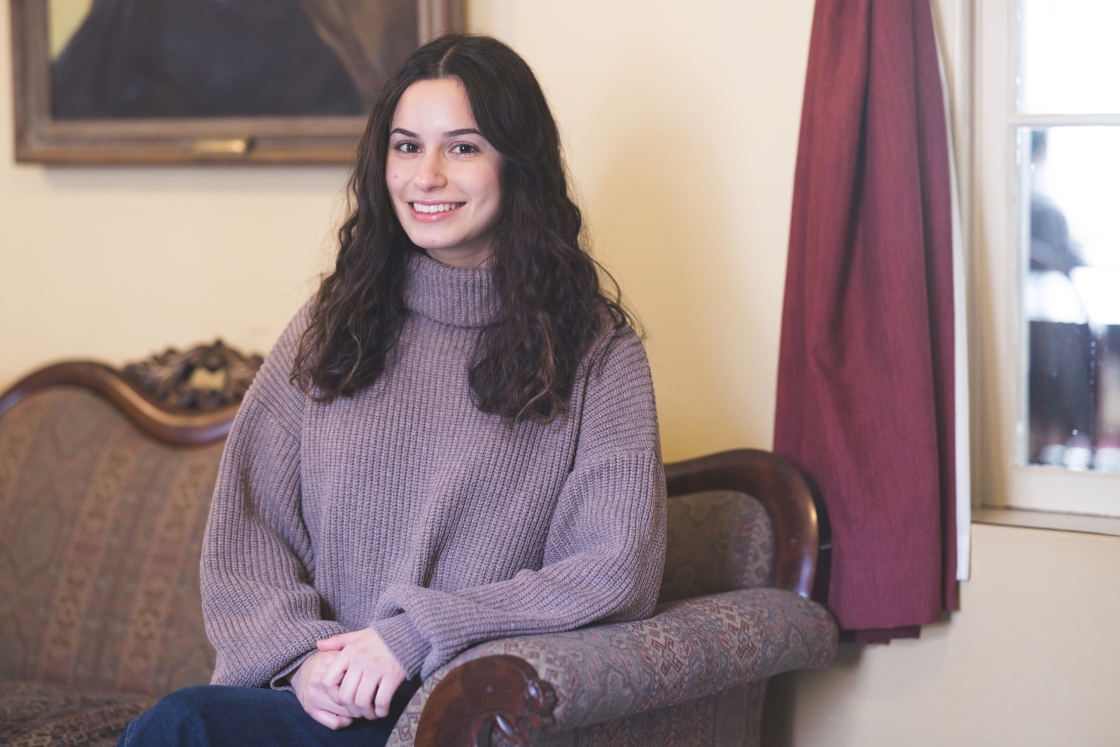To Melissa Centeno ’13 and Hannah Giorgis ’13, talking about campus climate shouldn't be limited to just one campus. That’s why they organized a gathering in Hanover for students from across the country to talk about improving openness and tolerance on college campuses.
Melissa Centeno ’13 (left) and Hannah Giorgis ’13 have worked to bring representatives from 11 institutions to Dartmouth for conversations about campus climates. (Photo by Eli Burakian ’00)
“We’re all having these conversations independently,” says Centeno. “Why not come together and discuss and see what we can learn from each other?”
Thanks to Centeno and Giorgis, Dartmouth is hosting the “Beyond the Brochures” conference on May 11. Students from 11 other colleges and universities will come to Hanover for a series of conversations and a keynote lecture on campus climate.
“The hope is to empower these future leaders with strategies that will assist them in mediating cultural conflict and understanding in a manner that will engender the eradication of cultural bias and ignorance, which ironically are challenges that continue to plague college and university campuses nationwide,” says Antonio Tillis, associate professor and chair of the African and African-American Studies Program, who has helped with conference planning.
The conference comes two weeks after Dartmouth suspended classes on April 24 for a day of reflection to talk about how the community can better engage respectfully on topics such as race, gender, identity, and sexual assault. Speeches and teach-ins across campus followed a lack of civil discussion and online threats directed at students who had protested at an event for admitted students earlier in April.
The conference will be highlighted by a keynote address by University of Pennsylvania Professor Salamishah Tillet, the co-founder and president of the non-profit A Long Walk Home. Established in 2003, A Long Walk Home seeks to end violence against girls and women and promote healing through art and performance. Tillet is the author of the book Sites of Slavery: Citizenship and Racial Democracy in the Post-Civil Rights Imagination. She has appeared on CNN, MSNBC, and NPR, and written for The Chicago Tribune and The Root.
Tillet’s talk, free and open to the public, will take place at 3 p.m. in Dartmouth 105.
For participants, there will also be two workshops and a dinner with Dean of the College Charlotte Johnson.
The representatives come from a mix of private and public schools, as well as research universities and liberal arts colleges, with the goal of bringing a variety of perspectives to the table. Institutions that will be represented include Columbia University, Harvard University, the University of Michigan, the University of North Carolina, Scripps College, Stanford University, and Yale University. Students from each university are asked to collaborate and bring a 10- to 15-page narrative about their campus experiences to the conference.
“I see a lot of this as brainstorming, with participants sitting around an easel of paper with a pen,” says Giorgis.
Centeno and Giorgis hope that through these conversations they can develop strategies to deal with hostile incidents on college campuses, and talk about the best ways to respond to such incidents. The two seniors think there is a lot to be gained through talking with students from other institutions.
“I hope students leave the conference with a feeling of solidarity, that they are not alone in this fight,” says Centeno.
Giorgis says she hopes students will be able to find a new perspective.
“I want participants to come away with the idea that they have a right to be there, a right to shape their universities,” says Giorgis.
The talk is supported by the Dean of the College’s Office and the African and African-American Studies Program.

